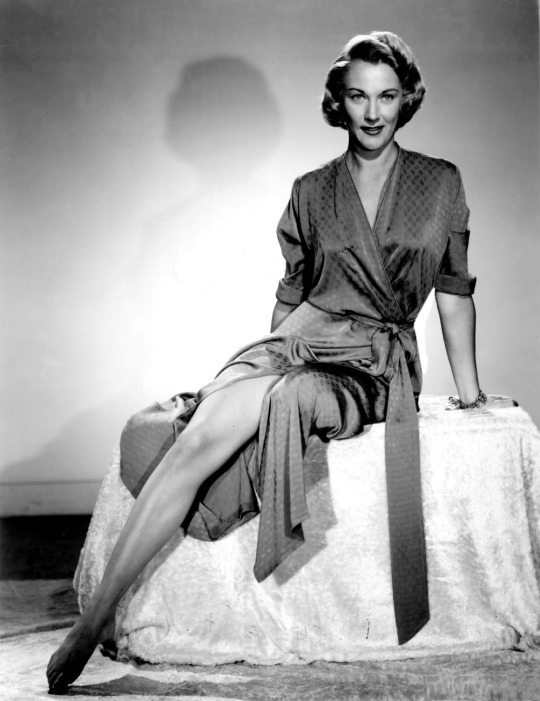#jeanne cooper
Text

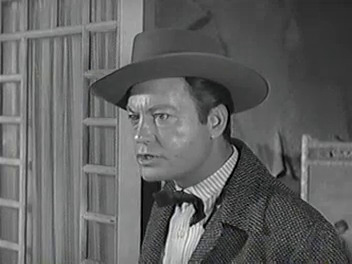
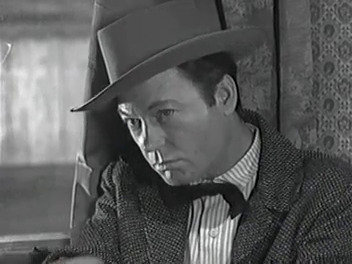
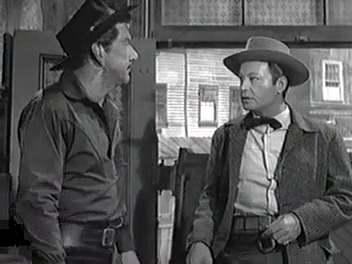
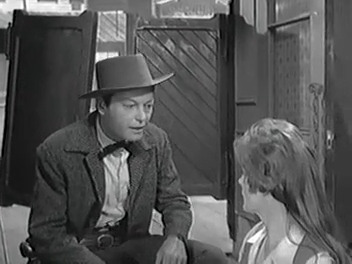
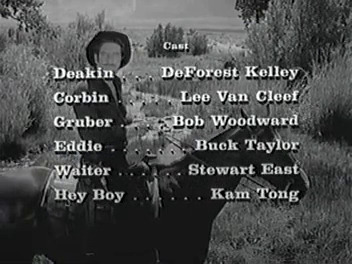
Today in the Department of Before They Were Star Trek Stars, DeForest Kelley guest stars in "The Treasure," episode 16 of the sixth season of Have Gun, Will Travel (original air date December 29, 1962).
Kelley plays a desperado who follows an ex-convict to a ghost town in hopes of finding the loot he was jailed for stealing.
Other Trek connections:
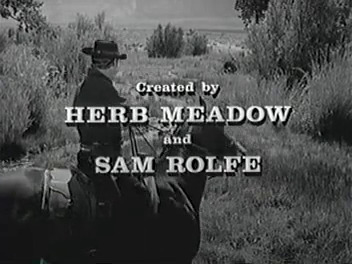

Have Gun, Will Travel co-creator Sam Rolfe also wrote the Next Generation episode "The Vengeance Factor" and the Deep Space Nine episode "Vortex."
#star trek#star trek tos#star trek the original series#star trek the animated series#laramie#1960s tv#tv sci fi#tv westerns#deforest kelley#richard boone#jeanne cooper#sam rolfe
30 notes
·
View notes
Text
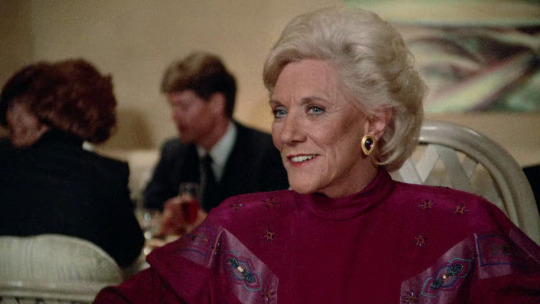




jeanne cooper as gladys becker in season one of l.a. law
primetime emmy award nominee for outstanding guest actress in a drama series
2 notes
·
View notes
Text
The Naked Street
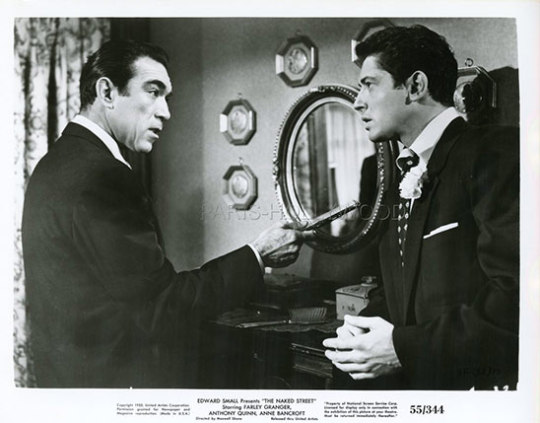
One pleasure I get out of watching old movies is catching a particularly strong performance from an uncredited actor and then discovering it’s someone whose work I’ve always enjoyed. In Maxwell Shane’s THE NAKED STREET (1955, TCM, YouTube), there’s a very good performance by a woman cast as the girlfriend who convinces small-time hood Jerry Paris to do the right thing. It turns out that was Jeanne Cooper, who did lots of good work in film and television before becoming the grand dame and one of the few interesting actors on THE YOUNG AND THE RESTLESS. Fortunately, the leads are mostly on her level. Anthony Quinn is a gangster who’s done a good job keeping ahead of the law until his sister (Anne Bancroft) gets knocked up by a punk (Farley Granger) slated for execution. He threatens and bribes witnesses into clearing the kid so the two can be married, and you know that’s not going to turn out well. Quinn is very good, and Granger surprisingly so. The former brings a lot of dimension and nuance to his performance. According to Eddie Muller, Granger imitated the film’s dialog director, Mickey Knox, and if he did, he did it well. He’s much tougher and more assertive than in many of his earlier films. Bancroft is wasted, but she’s not embarrassing. She never indicates or jumps at effects the way other actresses in similar roles often did. Granger made one more film before leaving Hollywood to study and work on stage in New York. Bancroft held out a few more years before making the same move and coming into her own as an actress. Shane’s direction is serviceable, though he stages one effective scene in which a reporter (Peter Graves) is beaten up by Quinn’s underlings. They pull him behind a billboard for safe driving, “The life you save may be your own,” and the whole thing is seen through the lattice work beneath the sign. The cast also includes Austrian actress Else Back as Quinn and Bancroft’s mother, animation star Sara Brenner as a crooked candy shop owner, Whit Bissell as the D.A., Joe Turkel as a minor hood named Shimmy and Lee Van Cleef as a fence.
3 notes
·
View notes
Text

Werner Klemperer-Jeanne Cooper "Red invisible" (5 steps to danger) 1957, de Henry S. Kesler.
5 notes
·
View notes
Text
8 maggio … ricordiamo …
8 maggio … ricordiamo …
#semprevivineiricordi #nomidaricordare #personaggiimportanti #perfettamentechic
2018: Marta DuBois, attrice panamense. (n. 1952)
2018: Lara Saint Paul, cantante italiana. (n. 1945)
2016: William Schallert, attore statunitense. (n. 1922)
2016: Elisa Mainardi, attrice italiana, una delle attrici preferite da Federico Fellini in vari suoi film. (n. 1930)
2013: Jeanne Cooper, attrice statunitense. (n. 1928)
2008: Dorothy Green, attrice statunitense. . (n. 1920)
2005: Nino…
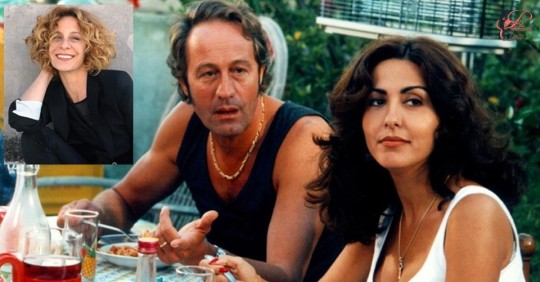
View On WordPress
#8 maggio#Adriano Micantoni#Barbara Lee Redfield#Barbara Payton#Bruno Landi#Dana Plato#Dirk Bogarde#Elisa Mainardi#Fay Spain#George Peppard#Jeanne Cooper#Lara Saint Paul#Marta DuBois#Morti 8 maggio#Nino Terzo#Personaggi morti 8 maggio#Piero Natoli#Ricordiamo#William Schallert
2 notes
·
View notes
Text
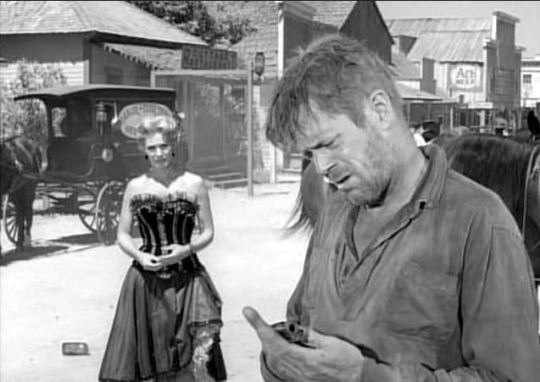
The Twilight Zone(1959) Mr. Denton on Doomsday
In the Old West, the drunkard Al Denton is bullied by the gunman Dan Hotaling to get some booze. The mysterious Henry J. Fate observes the humiliation and Al Denton finds a revolver on the street. When Dan sees Al Denton with a revolver in his hand, he challenges the drunk to a gunfight. Fate observes again and makes a movement with his hand that will change the life of Al Denton.
#The Twilight Zone#1959#tv series#Mr. Denton on Doomsday#old west#drama#fantasy#mystery#Dan Duryea#drunkard#arizona#fate#gunfight#Jeanne Cooper#S1E3#just watched
0 notes
Text

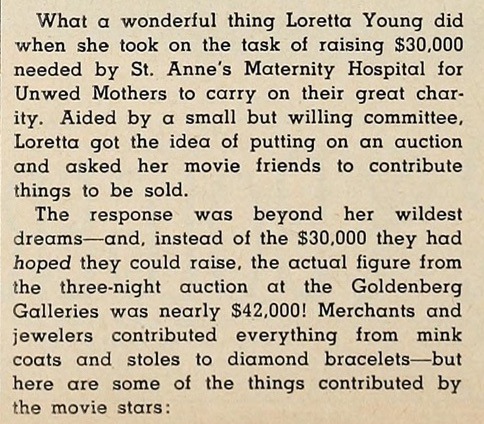
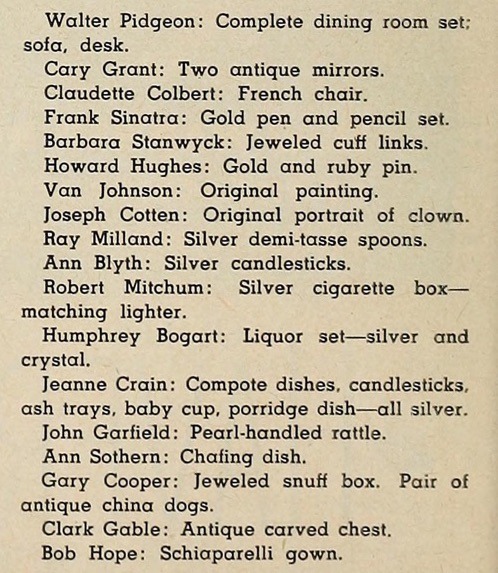
Modern Screen Magazine, September 1949.
#1940s#modern screen magazine#loretta young#irene dunne#deborah kerr#ray milland#rosalind russell#walter pidgeon#cary grant#claudette colbert#frank sinatra#barbara stanwyck#howard hughes#van johnson#joseph cotten#ann blyth#robert mitchum#humphrey bogart#jeanne crain#gary cooper#clark gable#bob hope#ann sothern#john garfield#old hollywood#old movie stars#old magazines#old movies#classic hollywood
50 notes
·
View notes
Text
@devotionobsessed wished upon a star !
Jeanne had fetched a blanket, and made some tea. Kazu always seemed to be working, and sometimes it left Jeanne worried for her well being. Kazu cared so much for Jeanne, but did she ever care for herself? So, she comes into her office and places the blanket over her shoulders and handed her the tea.
"Make sure you get some rest soon, okay?" Jeanne offers a rare smile that replaced the usual frown she'd adorn.
"I get worried about you a lot." Eyes look away as cheeks burn due to what she just admitted. Jeanne had a hard time being herself around others, but it seemed easy to open up around Kazu and be herself.


Kazu loved her job. She loved getting to protect people who couldn’t protect themselves. People who’d been failed by those who were supposed to protect them. She loved hand delivering karma to those who deserved it— she enjoyed it. She enjoyed inflicting the suffering they had given to others onto them.
One part she didn’t love, though? Paperwork. Equally important as actually leaving the building was keeping up the business front that protected her organization— which meant doing that job for real too. It was exhausting even at the best of times, she had to admit, but Kazu found it worth it.
Today was simply a day she’d ended up working later than usual. At least she was in her home office— she could give up at any time, really. Too focused on the paper in front of her, Kazu only half noticed Jeanne entering the room. She assumed it was a question or something of the sort, but was pleasantly surprised to find a blanket over her shoulders instead.
The tea was a welcome gift too— but the best, most energizing part? That smile. Jeanne was always the cutest thing in existence in Kazu’s eyes, but seeing her smile was a whole other feeling. Her cheeks flushed lightly as she set the tea down on her desk, mixture of embarrassment over being worried about and resisting the urge to interrupt and tell Jeanne she was gorgeous when she smiled.
So— she settled for grabbing Jeanne’s waist as soon as she’d finished speaking and pulling her down onto her lap. “I should do better to not worry you, but I’ll get some rest in a bit. Let me finish this last paper… just need to recharge my batteries first,” Kazu nuzzled her face into the crook of Jeanne’s neck, snuggling against her for a moment before pulling back to place a quick kiss to her cheek. “Pretty girl, you look so very sweet when you smile.”
#devotionobsessed#devotionobsessed ; jeanne#◟kazu kan ; ic .◝#◟you’ve got mail ; ask answered .◝#(SORRY IT TOOK ME A HOT SECOND TO ANSWER THIS)#(Kazu was not cooperating with being soft :|)
1 note
·
View note
Photo

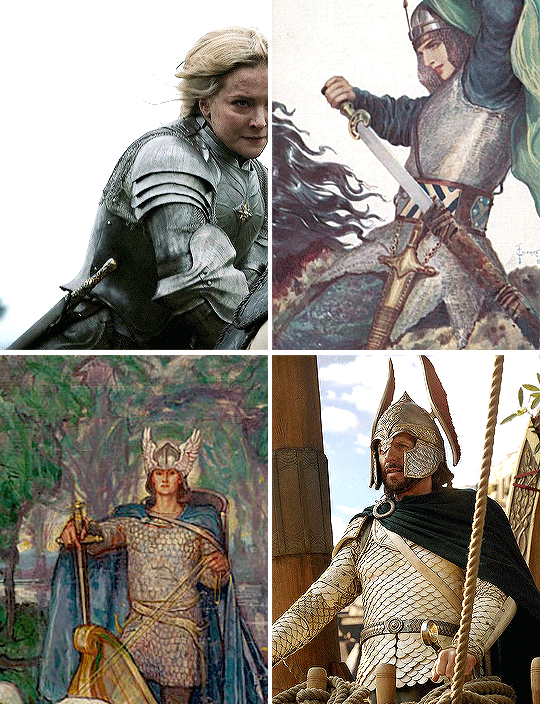
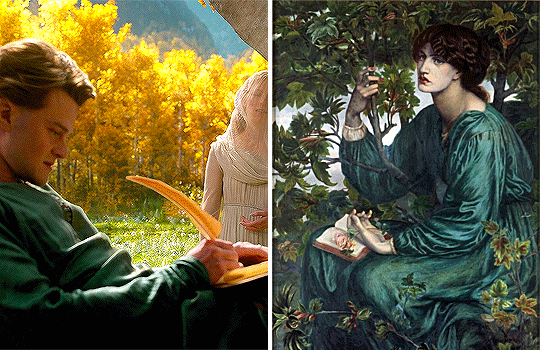
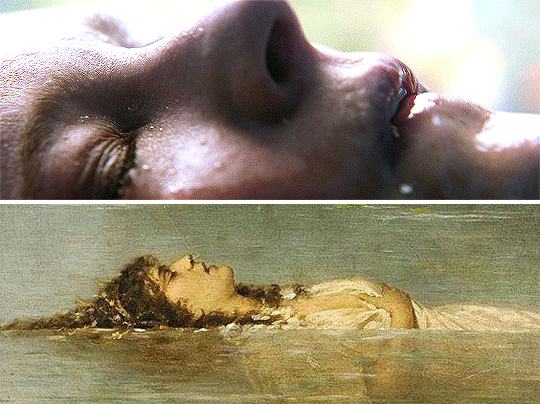
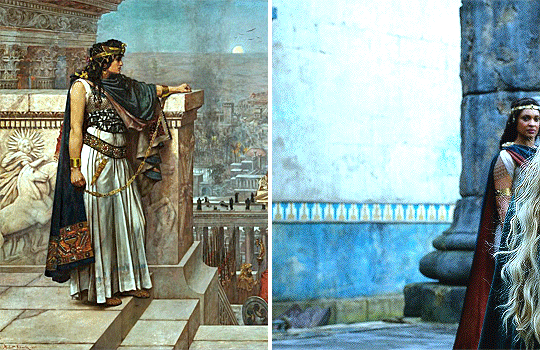
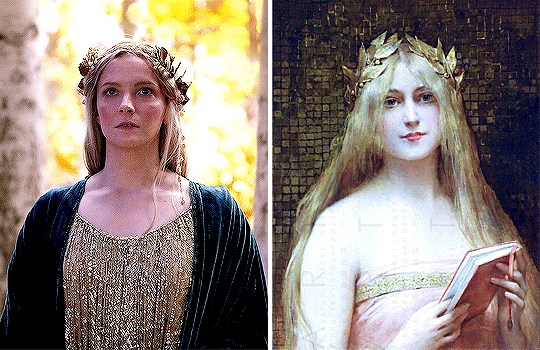

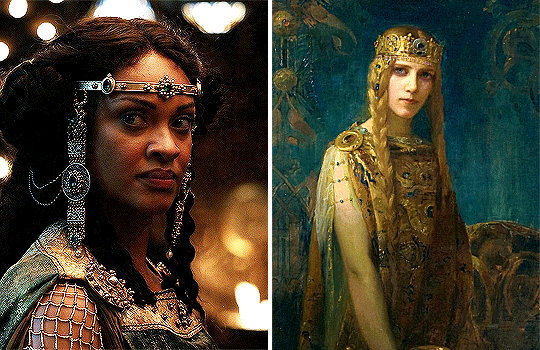
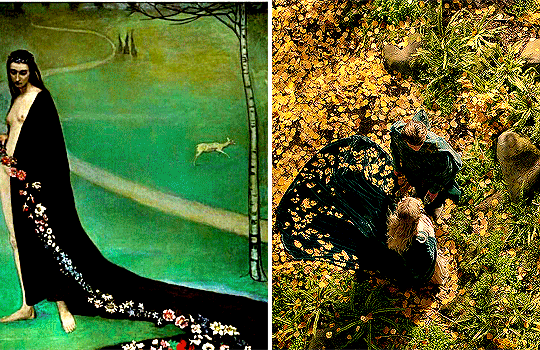

LORD OF THE RINGS + Art references
Albert Lynch - Jeanne d'Arc, 1903
Sergey Solomko | Nastasya Korolevichna ( Настасья Королевична)
VIOLET OAKLEY - Lohengrin, Knight of the Swan book cover, c. 1910.
Dante Gabriel Rossetti | The Day Dream (1880)
Theodor von der Beek | Ophelia , 1901
Herbert G Schmalz | - Zenobia's last look on Palmyra, 1888
Leon Francois Comerre | Girl with a Golden Wreath
Thomas Cooper Gotch | Destiny
Gaston Bussière | Femme à la couronne: la princesse Celte , 1911
Romaine Brooks | Femme Avec des Fleurs, 1912.
Elisabeth Louise Vigée-LeBrun | Portrait of Theresia, Countess Kinsky, 1793
Eleanor Fortescue-Brickdale | The Lover's World, 1905
#idk what this is whatever#the rings of power#tropedit#trop#ropedit#rings of power#tusersahar#hope you don't mind being tagged#gifs#*
2K notes
·
View notes
Text


#best childhood book#poll#preliminary round#julie of the wolves#protector of the small#nevermoor#the penderwicks#secret series#mr lemoncello's library#the dark is rising#pendragon#emily
283 notes
·
View notes
Text
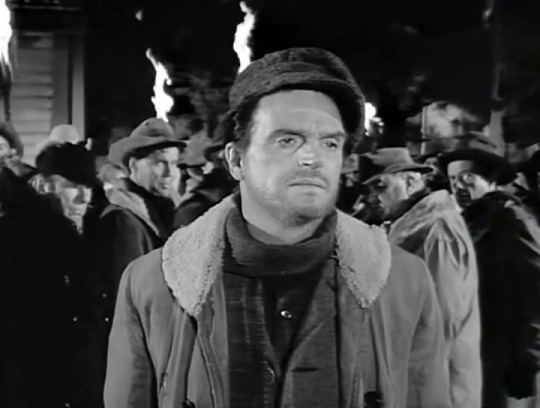


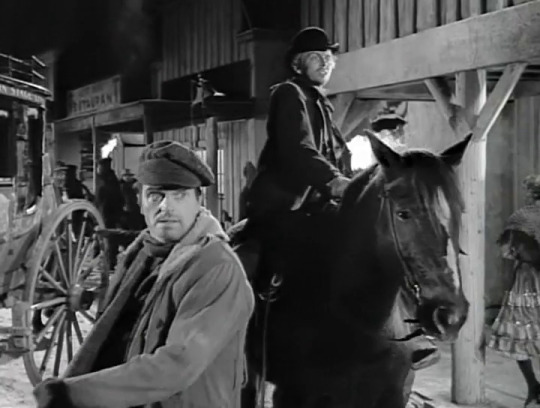


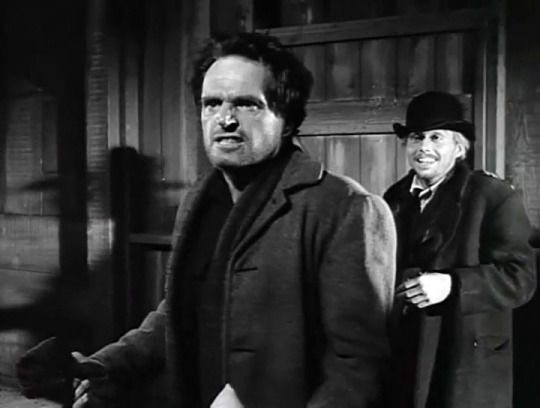
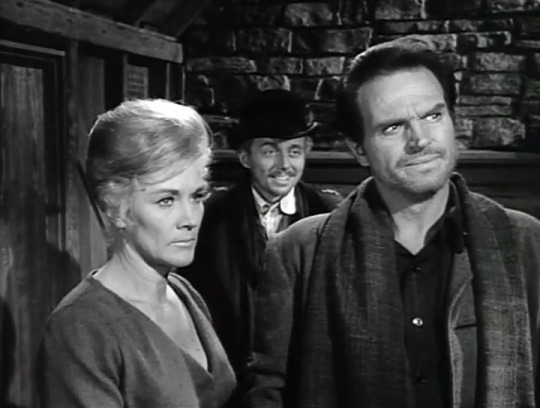


Denis Patrick being a handsome weasel in an episode of A Man Called Shenandoah (1965).
0 notes
Text
Gentleman Thief Bracket and Masterpost

[Image description: a 32-member tournament bracket labeled Gentleman/Phantom Thief Showdown with confetti and sparkles edited into it. The characters eliminated in the first round are: Four Horsemen (Now You See Me), Phantom R, Cat’s Eye, Catherine AKA Nightsmoke, Diamond Queen, Chat Noir (Granblue), The Scarlet Pimpernel, Assane Diop (Lupin), Kaitou Jeanne, Jean Lupin, and Thief/Tia (Diamond Jack), Lupin Red, Kaitou Kiramekiman, Kay Faraday, Roquefort Cookie, and Saint Tail. The characters eliminated in the second round are: Kaitou Joker, Kaitou Spade, Thieves Peter and Jenny, Sly Cooper, Pierre Despereaux, Mask⭐️DeMasque, Star Scarlet, and Blue Cat (Precure). The characters eliminated in the third round are: Lupin III, A. J. Raffles, Arsène Lupin, and Parker (Leverage). The characters eliminated in the fourth round are Carmen Sandiego and Peter Nureyev. The loser of the final round is Joker (Persona) and the winner is Kaitou KID. /End description]
Phew! That’s a lot of contestants! As mentioned, the lineup is completely random, so apologies in advance to the more obscure characters that are paired against popular ones, your presence is still meaningful 💜
Round 1:
Four Horsemen (Now You See Me) vs Kaitou Joker
Lupin III vs Phantom R (Rhythm Thief & the Emperor's Treasure)
Cat’s Eye vs Joker (Persona 5)
Kaitou Spade vs Catherine/Nightsmoke (Granblue Fantasy)
Thieves Peter and Jenny (Vocaloid) vs Diamond Queen (Kaitou Joker)
Peter Nureyev (The Penumbra Podcast) vs Chat Noir (Granblue)
The Scarlet Pimpernel/Sir Percy Blakeney vs. A.J. Raffles
Assane Diop (Lupin) vs Sly Cooper
Kaitou Jeanne (Kamikaze Kaitou Jeanne) vs Carmen Sandiego
Jean Lupin (London Detective Mystery) vs Pierre Despereaux (Psych)
Arsène Lupin vs Thief/Tia (Diamond Jack)
Lupin Red (Kaitou Sentai Lupinranger) vs Mask DeMasque/Ron DeLite (Ace Attorney)
Star Scarlet (Stellar Witch LIPS) vs Kaitou Kiramekiman)
Kay Faraday (Ace Attorney) vs Kaitou KID/Kuroba Kaito (Magic Kaito)
Roguefort Cookie (Cookie Run) vs Parker (Leverage)
Saint Tail (Saint Tail) vs Blue Cat (Precure)
Round 2:
Kaitou Joker vs. Lupin III
Joker (Persona 5) vs. Kaitou Spade
Peter Nureyev (The Penumbra Podcast) vs. Thieves Peter and Jenny (Vocaloid)
A. J. Raffles vs. Sly Cooper
Carmen Sandiego vs. Pierre Despereaux
Mask⭐️DeMasque (Ace Attorney) vs. Arsène Lupin
Star Scarlet (Stellar Witch LIPS) vs. Kaitou KID/Kuroba Kaito (Magic Kaito)
Parker (Leverage) vs. Blue Cat/Yuni (Precure)
Round 3:
Lupin III vs. Joker (Persona)
Peter Nureyev (The Penumbra Podcast) vs. A. J. Raffles
Carmen Sandiego vs. Arsène Lupin
Kaitou KID/Kaito Kuroba (Magic Kaito) vs. Parker (Leverage)
Semifinals:
Joker (Persona) vs. Peter Nureyev (The Penumbra Podcast)
Carmen Sandiego vs. Kaitou KID/Kaito Kuroba (Magic Kaito)
Third Place:
Carmen Sandiego vs. Peter Nureyev (The Penumbra Podcast)
Finals:
Joker (Persona) vs. Kaitou KID/Kaito Kuroba (Magic Kaito)
We have a winner! Congrats Kaitou KID!
By the way, we welcome propaganda! Feel free to send or @ us in posts detailing why your fav should win!
#update#gentleman thief#phantom thief#gentleman thief tournament#tournament poll#prelims#round 1#round 2#round 3#semifinals#third place#finals
78 notes
·
View notes
Text
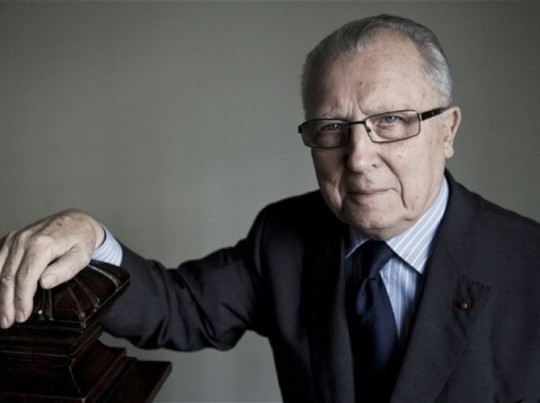
Jacques Delors, president of the European Commission during its most imperial and self-confident years, unwittingly became the Gallic symbol to British eurosceptiques of all they feared and despised about the great European project. This perplexed but did not faze him, especially given that after his departure the structure and aims of the European Union remained much as he had envisaged them during his decade from 1985 in Brussels. Appointed to a record three terms as president, he has claims to be the most significant architect and leader of the European project since its emergence following the second world war.
The irony was that the great achievement of Delors, who has died aged 98, was the creation of a single regulated market for trade, goods and services across the European Union – an idea that Margaret Thatcher, his nemesis, enthusiastically signed up to. However, he wanted to go much further than her and some other European leaders, seeing the concomitant need for a single currency and a more powerful, centralised federalist governing system in a global economy with competing power blocs: “National sovereignty no longer means much. . . voluntary cooperation never works,” he said. “In order to face American and Japanese challenges we need to be supranational” – this before the rise of China as an economic power.
Delors, with his lower middle-class background, his ferocious work ethic, his strong religious faith allied to an economist’s belief in fiscal restraint and anti-inflationary caution, might have been a natural ally of Conservative prime ministers. Thatcher backed his appointment to the commission in 1984, and his subsequent reappointment. But his very Frenchness – his strong accent, his pinched and somewhat rancorous manner, and his Gallic confidence in centralised government – counted against him as the tide of popular opinion on both sides of the Channel started to turn in reaction to economic downturn, job insecurity and rising unemployment. Certainly national governments made sure that no commission president would ever be so powerful again.
What was remarkable was that Delors did not come from the privileged French elite of énarques, graduates of the École Nationale d’Administration, whose expectation is that they will run things, or from a powerful party political powerbase, but had fought his way up through ability, application and hard work. The only child of Jeanne (nee Rigal) and Louis Delors, a grievously wounded veteran of the first world war who had left the rural region of Corrèze in south-central France to become a messenger at the Banque de France in Paris, Jacques was born in the working-class 11th arrondissement of the French capital.
His background – half respectable urban poor, half self-reliant rural peasant – did not turn him into a socialist but encouraged him to become a member of the Jeunesse Ouvrière Chrétienne (the Young Christian Workers) movement (and an able member of its basketball team). Delors’ devout Catholic faith shaped his politics, and although he became a member of the French Socialist party in the 1970s he said later: “I’ve never been fascinated by communism and Marxism – I am undoubtedly the only man on the French left who never has been. I believed one could improve society but not change society.” It was his Catholicism that fuelled his support for collective social responsibility and co-operation.
His education was disrupted by the second world war, and afterwards he was diverted from going to university by his father’s insistence that he should follow him into the Banque de France. Otherwise, he might have become a fashion designer, film director or sports journalist. Instead he worked as a securities manager, studied economics at evening classes and married another staff member, Marie Lephaille, who was of Basque origin, in 1948. The bank wanted to promote him, but in 1953 he accepted a job as an economist with a Christian trade union that appreciated his skill at explaining economic concepts clearly. When, years later, François Mitterrand asked him how he had acquired that skill, Delors replied: “If I am clear, it is because I have had little education. As I am not clever, before understanding something I have to make a huge effort.”
By the late 1960s that fluency and seriousness had taken him into politics, as an adviser to the Gaullist government and then into the Socialist party, tempering its secularism. Under Mitterand he became the government’s economics minister (1981-84), gaining the reputation of saving France from financial meltdown by reining in the socialists’ wildly unrealistic spending policies, curbing inflation and cutting the ballooning budget deficit, despite Mitterand’s cynical havering and the outright opposition of most of his fellow ministers.
He impressed European finance ministers and even eventually the sceptical Mitterand, though not enough to be made prime minister: “Delors,” said the president, “smells of the sacristy.” Instead, when there was a vacancy for the presidency of the commission, he was put up for that job as the acceptable French face of economic realism for leaders such as the German chancellor Helmut Kohl and Thatcher.
The commission, once described as a civil service with attitude (not only administering community policies but proposing and implementing its rules and regulations), was in a state of complacent near-torpor when Delors arrived in January 1985. Within a fortnight, following consultations with national governments, he shook things up with the announcement of plans to launch a European single market over the coming seven years, removing trading barriers and discrimination against foreign competitors. Stasis in decision-making in Brussels was countered by reducing countries’ vetoing powers. In constructing the single market he would have the enthusiastic support of the British Tory internal market, tax and customs commissioner Lord (Arthur) Cockfield.
More clearly than leaders such as Thatcher, who thought of it merely as a freeing up of markets, Delors saw the implications for states’ social and employment policies and, eventually, currencies as well: alarm bells rang when he announced that within a decade 80% of economic legislation, including taxation and social policy, would come from the commission. The single market was, certainly initially, a means of stopping Europe’s relative economic decline in the world, but it would also have wider international benefits. He told the European parliament that the member states would have to learn “to speak with a single voice and act together”, and added: “Are we Europeans capable of it? Whether it concerns currency instability, prohibitive rates of interest, hidden protectionism, a decline in aid to the poorest countries – no, Europe has not known how to lead the way.”
Under Delors, the commission became more forceful and outspoken, but also more tightly governed by the president’s cabinet coterie of mainly French staff. They – like him, but unlike many others in the commission – had a Stakhanovite work ethic and an arrogance in enforcing the president’s will across its departments.
Delors thought of himself as an internationalist, with a penchant for jazz and American films, but he was little travelled and struggled to appreciate national foibles and political differences. His strong French accent when speaking English and his austere and unsmiling appearance seemed to typify the arrogant European bureaucrat to the British tabloids, increasingly adopting the sceptical tone of the Thatcher government. He was wily but also outspoken, not always choosing his words carefully or respecting sensitivities.
In 1988 he told the TUC Congress that the commission would require governments to introduce pro-labour legislation, including a right to training and improved protection for workers. That swung the British left and the trade unions almost overnight in favour of Europe as a bulwark against Thatcherism, but it naturally infuriated the prime minister, who retaliated with a speech in Bruges. “We have not successfully rolled back the frontiers of the state in Britain only to see them reimposed at a European level with a European superstate exercising a new dominance from Brussels,” she said.
Thus was a new Tory trope born, gradually replacing the party’s previous pro-Europeanism, though two years later Thatcher’s “No! No! No!” to Delors and federalism in the Commons was what precipitated her downfall. More demotically, “Up Yours Delors!” was the Sun’s headline response, reflective of a growing identification of the commission president with the ills of Europe.
By the early 1990s, with the single market in place, Delors’ plans for the next stage – the single currency and political union – were causing consternation among voters in other countries besides Britain. His perceived stubbornness was exemplified when he attempted to derail a deal on farm subsidies with the US, holding up a world trade agreement, because he believed it would undercut French agriculture. The commission’s pre-emptive announcements across a range of issues fed into a wider perception of its indifference to national preferences and democratic decisions.
This came to a head with the Maastricht Treaty of 1992, which – over 250 convoluted and constipated pages – outlined the creation of the European Union, explained new modes of governance within it, and detailed steps towards the adoption of the euro through the creation of the European Monetary System. Its passage through the member states, in legislatures and referendums, was fraught: it nearly brought down John Major’s government in the UK, was initially rejected by the Danes, and was only endorsed by the narrowest of margins by the French. The treaty became a symbol of an out-of-touch bureaucracy and commission president, both unable to connect with or explain to Europe’s voters either why the changes were necessary or what their benefits would be.
Delors’ infuriated statements, such as in a speech in Quimper, Brittany, where he asserted that “there’s no place in a democracy for people who call for a non,” only fuelled the mainly rightwing campaigns against the treaty and created resentment about Europe’s creeping interference in national democratic procedures.
Nevertheless, the treaty eventually passed. Delors had wrestled Europe into a new, more unified and federal direction, with the new states of eastern Europe queueing up to join. However, the treaty was also the harbinger of growing difficulties to come, especially as the single currency intially faltered in the following decade.
Delors, by then the longest serving president in the commission’s history, seemed to recognise that his time was now over. “I became the symbol of an idea of Europe which is in the process of vanishing,” he said in December 1993. “I am discouraged to the extent that I can no longer be useful. I can no longer stamp my mark on Europe. It’s finished [and] frankly, I am no longer the man for the job.”
It was assumed that when Delors stepped down from the presidency in 1995 that he would resume a political career in France, perhaps as a socialist candidate for the presidency. But it was not to be. The French elected the Gaullist Jacques Chirac to succeed Mitterrand, and by then Delors was anyway touching 70 and troubled by sciatica. In the EU, the heads of government had had enough of an overweening, over-ambitious commission and replaced Delors with the ineffectual former prime minister of Luxembourg, Jacques Santer – a man with no ambition to impose his will either on colleagues or on the governments of nations larger than his own.
Delors’ ambitions for Europe were hollowed out: even as he retired, the Balkan countries were erupting in ethnic violence that the EU proved powerless to prevent or stop. In a quiet retirement, he still lived unassumingly in a small Paris apartment, emerging not to pronounce on world events but to commentate on the Tour de France.
He and his wife had two children. Their son, Jean-Paul, a journalist, died of leukaemia in 1982 aged 29. Marie died in 2020. Their daughter, Martine Aubry, became a French government minister, mayor of Lille and leader of the French Socialist party (2008-12).
🔔 Jacques Lucien Jean Delors, politician and public servant, born 20 July 1925; died 27 December 2023
Daily inspiration. Discover more photos at Just for Books…?
7 notes
·
View notes
Text

Jeanne Cooper (Taft, California, 25/10/1928-Los Ángeles, California, 8/05/2013).
5 notes
·
View notes
Text
Last Edited: 21 April 2024
Polycules that are in the running:
My Little Pony: Friendship Is Magic
Twilight Sparkle, Pinkie Pie, Applejack, Rainbow Dash, Rarity and Fluttershy
Stephen King's It
Richie Tozier, Eddie Kaspbrak, Beverly Marsh, Bill Denbrough, Ben Hanscom, Stan Uris, Mike Hanlon, Kay McCall, Audra Phillips and Patty Blum
Sherlock Holmes
Irene Adler, Sherlock Holmes, John Watson, Mary Morstan, and Godfrey Norton
Doki Doki Precure
Cure Heart, Cure Diamond, Cure Rosetta, Cure Sword and Regina
A3!
Tsumugi Tsukioka, Tasuku Takato, Hisoka Mikage, Homare Arisugawa, Azuma Yukishiro and Guy
Persona 5
Akira Kurusu/Ren Amamiya, Ryuji Sakamoto, Ann Takamaki, Yusuke Kitagawa, Makoto Niijima, Futaba Sakura, Haru Okumura, Goro Akechi, Sumire Yoshizawa, Morgana and Yuuki Mishima
Akira Kurusu/Ren Amamiya, Hifumi Togo, Chihaya Mifune, and Lavenza
Witch's Heart
Claire Elford, Noel Levine, Ashe Bradley, Wilardo Adler and Sirius Gibson
Ensemble Stars!!
Leo Tsukinaga, Tsukasa Suou, Arashi Narukami, Izumi Sena, Ritsu Sakuma, Mao Isara, Hokuto Hidaka, Subaru Akehoshi and Makoto Yuuki
Stranger Things
Steve Harrington, Eddie Munson, Jonathan Byers, Nancy Wheeler, Robin Buckley, Argyle, Chrissy Cunningham, Eden Bingham, and Vickie.
Star Trek DS9
Elim Garak, Julian Bashir, Miles O'Brien, Keiko O'Brien, Kira Nerys, Jadzia Dax, Odo Ital, Quark, Worf, Ezri, Sisko, Lwaxana Troi, Kasidy Yates-Sisko, and Lenara Kahn
The Owl House
Luz Noceda, Amity Blight, Willow Park, Hunter, and Gus Porter
Dracula
Jonathan Harker, Mina Harker, Lucy Westenra, Quincey Morris, Jack Seward, Arthur Holmwood, and Abraham Van Helsing
The Breakfast Club
Brian Johnson, Andrew Clark, Allison Reynolds, Claire Standish, and John Bender
Winx Club
Bloom, Stella, Tecna, Musa, Flora, Aisha, Sky, Brandon, Timmy, Riven, Helia, Nex and Nabu
Resident Evil
Leon S Kennedy, Claire Redfield, Ada Wong and Helena Harper
The Case Study of Vanitas
Vanitas, Noe Archiviste, Dominique de Sade and Jeanne
Scooby Doo
Fred Jones, Daphne Blake, Shaggy Rogers, Velma Dinkley, Hot Dog Water, and Crystal.
Buffy The Vampire Slayer
Darla, Angel(us), Drusilla, and Spike/William
The Legend of Zelda
Revali, Zelda, Link, Mipha, Sidon, Yona, Paya and Tauro
The Magicians
Fen, Eliot Waugh, Margo Hanson, Josh Hoberman, Quentin Coldwater, and Arielle
Haikyū!!
Kiyoko Shimizu, Yachi Hitoka, Yamaguchi Tadashi, Tsukishima Kei, Bokuto Kōtarō, Akaashi Keiji, Kuroo Tetsurō, Kozume Kenma, Hinata Shōyō, Daichi Sawamura, Kageyama Tobio, Oikawa Tooru, Iwaizumi Hajime, Terushima Yuuji, and Ushijima Wakatoshi
Genshin Impact
Cyno, Alhaitham, Kaveh, Tighnari, Dehya, Nilou, Faruzan, Dunyarzad, and Candace
Kaeya, Rosaria, Albedo, and Sucrose
Neuvillette, Wriothesley, Navia, Clorinde, Zhongli, and Childe
Arataki Itto, Kujou Sara, Kamisato Ayato, Gorou, Thoma, and Sangonomiya Kokomi
Heaven Official's Blessing
Xie Lan, Hua Cheng, Mu Qing, Feng Xin, Yin Yu, and Quan Yizhen
Torchwood
Jack Harkness, Gwen Cooper, Rhys Williams, Owen Harper, Ianto Jones, and Toshiko Sato
Spiderman
Peter Parker, Harry Osborn, Mary-Jane Watson, Gwen Stacy, Liz Allan, Felicia Hardy, and Johnny Storm
Beastars
Legosi, Louis, Haru, and Juno
Lupin III
Lupin III, Goemon Ishikawa XIII, Daisuke Jigen, and Fujiko Mine
Demon Slayer
Tengen, Makio, Suma, and Hinatsuru
Omori
Sunny, Kel, Basil, and Aubrey
Cookie Run
Herb Cookie, Vampire Cookie, Sparkling Cookie, Mint Choco Cookie, and Cocoa Cookie
The Grail Quest
Percival, Galahad, Bors, Dinadrane, and Blanchefleur
Danganronpa 2: Goodbye Despair/Super Danganronpa 2
Hajime Hinata, Kazuichi Soda, Fuyuhiko Kuzuryu, Sonia Nevermind, and Akane Owari
Zero Escape
Akane Kurashiki, Junpei, Sigma Klim, Carlos, Diana, and Snake
Roswell New Mexico
Nora Truman, Louise Truman, Theo, Tripp Manes and Roy Bronson
Max Evans, Isobel Evans, Michael Guerin, Liz Ortecho, Kyle Valenti, Maria DeLuca, Alex Manes, Jenna "Cam" Cameron, Heath, Dallas Haines, Greg Manes and Anatsa
The Raven Cycle
Blue Sargent, Richard Gansey, Ronan Lynch, Adam Parrish, Noah Czerny, and Henry Cheng
Warcraft
Khadgar, Kalecgos, Illidan, Kael'thas Sunstrider, Vashj, Arthas Menethil, Jaina Proudmoore, Nathanos Blightcaller, Sylvanas Windrunner, Tiffin Wrynn, Varian Wrynn, Halduron Brightwing, Thalyssra, Lor'themar Theron, and Rommath
The Book of Firsts
Mika, Rin, Bran, and Kyou
Welcome to Demon School Iruma-kun
Suzuki Iruma, Asmodeus Alice, Valac Clara, Azazel Ameri, and Purson Soi
My School President
Gun, Tinn, Sound, Win, Tiw, Por, Yo, Nook, Pat, and Kajorn
Bad Buddy
Pat, Pran, Korn, and Wai
Guardian Tales
Knight, Elvira, Arabelle, Beth, Priscilla, Yuze, Bianca, Loraine, Eva, and Camilla
Word of Honor/Faraway Wanders
Wen Kexing, Zhou Zishu, Han Ying, Jing Beiyuan, and Wuxi
The New Teen Titans
Dick Grayson, Starfire, Victor Stone, Raven, Joseph Wilson, Donna Troy, Garfield
The Locked Tomb
Ianthe, Tridentarius, Gideon Nav, Harrowhark Nonagesimus, Alecto the First, John Gaius, Mercymorn the First, and Augustine the First
Baldur's Gate 3
Astarion, Gale, Lae'zel, Karlach, Shadowheart, Wyll, and Durge
Kagerou Project
Ayano Tateyama, Shintaro Kisaragi, Takane Enomoto, and Haruka Kokonose
NU Carnival
Eiden, Aster, Morvay, Yakumo, Edmond, Olivine, Quincy, Kuya, Garu, Blade, Dante, Rei, and Karu
Only Friends
Top, Mew, Ray, Sand, Boston, Nick, and Boeing
The Scum Villain's Self-Saving System
Luo Binghe, Shen Qingqiu, Shang Qinghua, and Mobei-jun
16 notes
·
View notes
